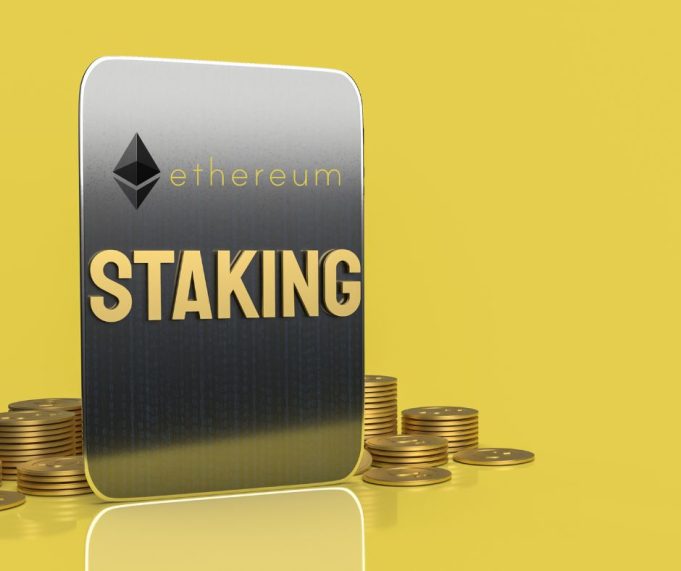The U.S. Securities and Exchange Commission (SEC) and Kraken, a leading crypto exchange platform, reached a surprise settlement last week, raising questions about the future of “staking” on blockchains like Ethereum. Ethereum experts and blockchain analysts believe this development may have positive effects, such as helping to decentralize the Ethereum network and making it easier for service providers to explain how they earn yield for retail investors. The settlement could also provide more clarity and transparency for investors, allowing them to make more informed decisions about their investments.
Kraken, a cryptocurrency exchange, has been forced to wind down its staking-as-a-service offering to U.S. clients due to a settlement with the SEC. This service allowed retail investors to stake cryptocurrency with blockchains in exchange for yield. Staking is a form of security guarantee in exchange for rewards, similar to interest payments, and is used by proof-of-stake blockchains like Ethereum. Ethereum famously transitioned from proof-of-work to proof-of-stake last year. The SEC settlement has put an end to Kraken’s staking-as-a-service offering in the U.S.
Kraken, one of the largest staking-as-a-service platforms, has recently settled with the SEC, classifying its offering as a security. This could have major implications for the staking landscape, with around $25 billion worth of ether currently staked on Ethereum. Decentralized staking services like Lido and Rocket Pool are considering the potential benefits of the SEC’s action, while solo-stakers that help run Ethereum without an intermediary may see a silver lining in the form of a more secure and decentralized network.
Staking as a service platforms provide a way for retail investors to earn interest on their Ethereum investments without the need for a minimum of 32 ETH (~$50,000). Exchanges like Kraken and Coinbase have stepped in to help by pooling user funds together and taking care of the complicated task of setting up a node on the Ethereum network. However, SEC commissioner Hester Peirce has noted that staking services are not uniform and one-off enforcement actions and cookie-cutter analysis does not suffice. Staking as a service platforms provide a way for retail investors to earn interest on their Ethereum investments without the need for a minimum of 32 ETH (~$50,000).
Coinbase and Kraken are two cryptocurrency exchanges that offer staking services to their users. The SEC recently took issue with Kraken’s staking service, claiming that the returns paid to users were not necessarily dependent on actual returns that Kraken received from staking. Coinbase insists that its own service is different, as it directly ties user payouts to the rewards earned via staking. Coinbase CEO Brian Armstrong is willing to fight the SEC should they come after Coinbase’s staking offering, but the outcome is uncertain.
The SEC ruling on Kraken has caused a stir in the cryptocurrency staking market. Coinbase analysts have noted that the developments around Kraken will likely affect the “pace of staking growth going forward.” In response to the ruling, investors have turned to decentralized staking services such as Lido, which removes access barriers to staking similar to centralized services. Lido and other decentralized staking services run their operations entirely on smart contracts, which are self-executing computer programs that live on blockchains. The SEC ruling has caused some uncertainty in the staking market, but investors are finding new ways to access staking services through decentralized platforms.
Decentralized staking-as-a-service offerings, like Lido, are gaining traction as an alternative to centralized crypto exchanges. Unlike centralized exchanges, these services don’t have a management team pooling users’ money, which could make them less likely to draw scrutiny from regulators. Lido currently accounts for 29% of the total share of staked ETH, and if centralized staking-as-a-service models disappear, it could become even more popular. Decentralized staking-as-a-service offerings offer users the ability to stake their crypto assets without having to worry about the security of their funds. This could be a great option for those looking for a secure and reliable way to earn passive income from their crypto holdings.
The SEC’s enforcement action against Kraken could be a silver lining for the Ethereum community, as it could help shift control over the network to a larger set of people. Jaydeep Korde, whose company Launchnodes builds infrastructure to help people with 32 ETH spin up a node themselves, believes that staking services like Kraken’s undermine crypto’s goal of creating a decentralized financial system. He believes that the news about Kraken may finally push those with 32 ETH towards solo-staking, where they opt to run their own nodes rather than hand control to a third party. Solo-staking could be a great way for people to take control of their own financial security and help create a more decentralized financial system.
The introduction of Ethereum 2.0 is a major step forward for decentralization. Ethereum 2.0 is a proof-of-stake network, meaning that one’s stake in the network equates to their power over it. Ben Edgington, a product manager at Ethereum research and development firm ConsenSys, believes that the new system is good for decentralization, as it prevents a single entity from controlling too much of the network’s stake. This ensures that the protocol remains healthy and that no one party can slow down or block certain kinds of transactions. Ethereum 2.0 is a major step forward for decentralization and will help ensure that the network remains secure and reliable.
The SEC’s recent settlement with Kraken could help make Ethereum’s proof-of-stake system harder to monopolize. Ethereum’s new proof-of-stake model was designed to make the network more decentralized and less susceptible to centralization by a handful of big mining syndicates. The growth of staking-as-a-service platforms had threatened to jeopardize this goal, but the SEC’s settlement with Kraken could help ensure that Ethereum remains an army of tens of thousands of solo node operators, rather than a few large data centers.













